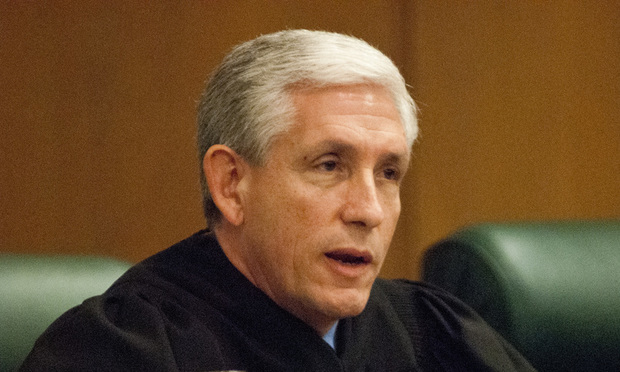High Court Says Judge Declared Mistrial Too Soon
"The trial court declared the mistrial without sufficient factual support and without considering less drastic alternatives," Justice David Nahmias wrote. "We reverse."
April 18, 2018 at 06:36 PM
4 minute read

Because a judge jumped too quickly to declaring a mistrial, a man charged with a murder in Macon four years ago—when he was 17—will soon walk free and cannot be tried again, the Georgia Supreme Court has ruled.
“The court said that the deliberations were contentious and that it declared the mistrial 'in the interest of juror safety.' Having reviewed the record, we conclude that the trial court declared the mistrial without sufficient factual support and without considering less drastic alternatives to terminating the trial. Because there was no manifest necessity for a mistrial, we reverse,” Justice David Nahmias wrote in a unanimous opinion released Monday.
“In its determination that a mistrial was necessary to ensure the jurors' safety, the court relied on the deputy sheriff's reports of what he perceived to be heated and volatile deliberations. Contentious jury deliberations, without more, do not establish the manifest necessity required for a constitutionally permissible mistrial,” Nahmias said. Then he added, quoting a 2013 opinion in Cernas v. Hedgpeth, “If heated debate alone were sufficient grounds for mistrial in all criminal cases, the criminal justice system could not function.”
When Macon Judicial Circuit Superior Court Judge Howard Simms declared the mistrial, the jury had only deliberated a total of about three hours following a four-day trial, according to the decision. The prosecutor spoke in favor of a mistrial over an Allen charge to instruct the jury to keep trying. The defense objected to the mistrial, saying that three hours of deliberation was not unreasonable, Nahmias said.
Nahmias agreed with defense attorneys that trying Jedarrius Meadows again would amount to double jeopardy. “Particularly given the delay between the mistrial and this decision, he should be promptly ordered released from confinement upon the return of the remittitur from this Court,” Nahmias said.
That delay of over a year was not explained, the court said.
Defense attorneys Mark Barnes and James Davis of Macon visited their client in jail Monday morning to tell him they had won. He had already heard the news from his mother, who works at the post office. “He was very happy,” Barnes said.
“We told him we were extremely confident in our case and were prepared to take this all the way to the U.S. Supreme Court if necessary,” Barnes said.
In the fifth footnote of the opinion, Nahmias gave a hint at his appraisal of Meadows' case.
“Indeed, having reviewed the record, the evidence of Appellant's guilt presented at trial was not compelling, although it may have been legally sufficient to support guilty verdicts if viewed in the light most favorable to the State. So this is a case where the defendant's interest in having his first trial proceed to a verdict is not merely theoretical,” Nahmias said.
Meadows testified at trial that not only was he innocent of murder, but also he was not even there in the baseball park when Damion Clayton was shot and killed, Barnes said. His only connection was that he had been at a carnival a couple of hours earlier with one of his co-defendants. Their cases were severed from his after they both pleaded guilty to lesser charges—aggravated assault and armed robbery—and identified Meadows as the shooter, according to the opinion and the defense attorney. They were given 20- to 30-year prison sentences but would be eligible for parole, according to Barnes. He said Meadows was offered life with the possibility of parole, if he would plead guilty to murder, but refused.
“They made a deal with the devil,” Barnes said, speaking of the prosecutors' agreement with the co-defendants—one of whom changed his mind at the trial.
“We stand by the evidence presented at trial that proves Mr. Meadows' guilt,” Macon Judicial Circuit District Attorney K. David Cooke said by email Wednesday. “While we respect the Georgia Supreme Court's opinion, we strongly disagree with it.”
The case is Meadows v. State, No. S18A0314.
This content has been archived. It is available through our partners, LexisNexis® and Bloomberg Law.
To view this content, please continue to their sites.
Not a Lexis Subscriber?
Subscribe Now
Not a Bloomberg Law Subscriber?
Subscribe Now
NOT FOR REPRINT
© 2025 ALM Global, LLC, All Rights Reserved. Request academic re-use from www.copyright.com. All other uses, submit a request to [email protected]. For more information visit Asset & Logo Licensing.
You Might Like
View All
Law Firms Expand Scope of Immigration Expertise Amid Blitz of Trump Orders
6 minute read
Bass Berry & Sims Relocates to Nashville Office Designed to Encourage Collaboration, Inclusion
4 minute read
Gunderson Dettmer Opens Atlanta Office With 3 Partners From Morris Manning
3 minute read
Trending Stories
- 1Uber Files RICO Suit Against Plaintiff-Side Firms Alleging Fraudulent Injury Claims
- 2The Law Firm Disrupted: Scrutinizing the Elephant More Than the Mouse
- 3Inherent Diminished Value Damages Unavailable to 3rd-Party Claimants, Court Says
- 4Pa. Defense Firm Sued by Client Over Ex-Eagles Player's $43.5M Med Mal Win
- 5Losses Mount at Morris Manning, but Departing Ex-Chair Stays Bullish About His Old Firm's Future
Who Got The Work
J. Brugh Lower of Gibbons has entered an appearance for industrial equipment supplier Devco Corporation in a pending trademark infringement lawsuit. The suit, accusing the defendant of selling knock-off Graco products, was filed Dec. 18 in New Jersey District Court by Rivkin Radler on behalf of Graco Inc. and Graco Minnesota. The case, assigned to U.S. District Judge Zahid N. Quraishi, is 3:24-cv-11294, Graco Inc. et al v. Devco Corporation.
Who Got The Work
Rebecca Maller-Stein and Kent A. Yalowitz of Arnold & Porter Kaye Scholer have entered their appearances for Hanaco Venture Capital and its executives, Lior Prosor and David Frankel, in a pending securities lawsuit. The action, filed on Dec. 24 in New York Southern District Court by Zell, Aron & Co. on behalf of Goldeneye Advisors, accuses the defendants of negligently and fraudulently managing the plaintiff's $1 million investment. The case, assigned to U.S. District Judge Vernon S. Broderick, is 1:24-cv-09918, Goldeneye Advisors, LLC v. Hanaco Venture Capital, Ltd. et al.
Who Got The Work
Attorneys from A&O Shearman has stepped in as defense counsel for Toronto-Dominion Bank and other defendants in a pending securities class action. The suit, filed Dec. 11 in New York Southern District Court by Bleichmar Fonti & Auld, accuses the defendants of concealing the bank's 'pervasive' deficiencies in regards to its compliance with the Bank Secrecy Act and the quality of its anti-money laundering controls. The case, assigned to U.S. District Judge Arun Subramanian, is 1:24-cv-09445, Gonzalez v. The Toronto-Dominion Bank et al.
Who Got The Work
Crown Castle International, a Pennsylvania company providing shared communications infrastructure, has turned to Luke D. Wolf of Gordon Rees Scully Mansukhani to fend off a pending breach-of-contract lawsuit. The court action, filed Nov. 25 in Michigan Eastern District Court by Hooper Hathaway PC on behalf of The Town Residences LLC, accuses Crown Castle of failing to transfer approximately $30,000 in utility payments from T-Mobile in breach of a roof-top lease and assignment agreement. The case, assigned to U.S. District Judge Susan K. Declercq, is 2:24-cv-13131, The Town Residences LLC v. T-Mobile US, Inc. et al.
Who Got The Work
Wilfred P. Coronato and Daniel M. Schwartz of McCarter & English have stepped in as defense counsel to Electrolux Home Products Inc. in a pending product liability lawsuit. The court action, filed Nov. 26 in New York Eastern District Court by Poulos Lopiccolo PC and Nagel Rice LLP on behalf of David Stern, alleges that the defendant's refrigerators’ drawers and shelving repeatedly break and fall apart within months after purchase. The case, assigned to U.S. District Judge Joan M. Azrack, is 2:24-cv-08204, Stern v. Electrolux Home Products, Inc.
Featured Firms
Law Offices of Gary Martin Hays & Associates, P.C.
(470) 294-1674
Law Offices of Mark E. Salomone
(857) 444-6468
Smith & Hassler
(713) 739-1250






